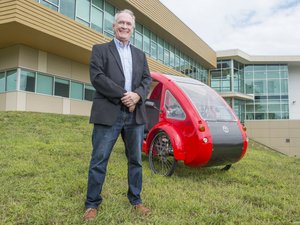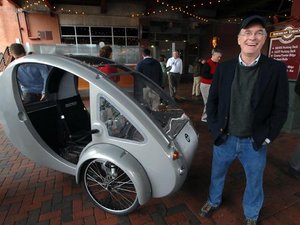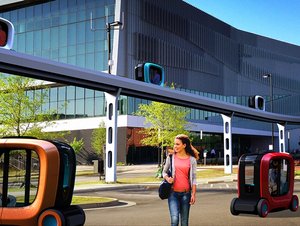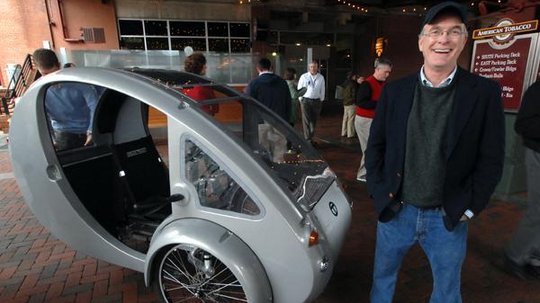
Five years after next-gen vehicle startup Organic Transit filed for Chapter 7 bankruptcy protection, the founder is bringing back the ELF.
The ELF vehicle – “electric, light and fun” – a solar-powered bike-car hybrid developed by Raleigh entrepreneur Rob Cotter, could be making a comeback.
After a seven-hour charge of sunlight (or just 90 minutes plugged into an outlet) the 150-pound tricycles could take off at speeds of 30 miles an hour, attracting celebrity fans like Jerry Seinfield. But neither the buzz nor the mission to lower carbon emissions could keep it alive. At least not in 2019.
But now, Cotter says he's bought back Organic Transit through his new company, Environmental Transit Authority, and has plans to someday relaunch the ELF.
In an interview with the Triangle Business Journal, Cotter detailed how it happened and why this time things will be different.
Following the Organic Transit’s eventual asset sale to Phoenix-based Sun MicroMobility in 2020, Cotter stayed busy. He spoke at an autonomy conference in Paris, did consulting and worked on other vehicle designs. He was even finalizing plans to start another endeavor when, about a year ago, “I heard they wanted to sell it.”
ELF had always remained a passion project in the back of Cotter's mind, and he worked to round up the capital, a process that took about a year.
Cotter declined to give deal terms. But he’s not doing it alone, having teamed up with California serial entrepreneur (and legacy ELF customer) Guy Primus as a business partner.
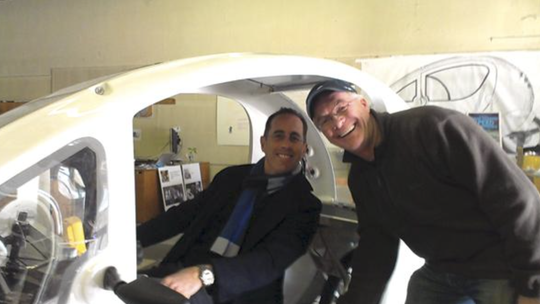
Cotter said the business plan has evolved since the initial bankruptcy, and the environment itself is different. A plethora of electric vehicles and electric bikes have started up operations over the past few years, many failing to produce viable products.
“I do think it’s interesting times for sure,” he said. “I feel like a lot of these companies in the EV space, having come and gone, has kind of cleared the runway a little bit. We have a history of actually delivering on product and that’s going to be the standout.”
It’s a small group today, about three full-time employees and some part-timers, seven people altogether. And the plan is to slowly start the rollout.
Cotter admits, “We were really good at putting them out, but we weren’t that good at fundraising.”
This time, he’s putting more attention on building a foundation, he said.
“Last time we were banging them out the door,” he said. “We just felt like if you can get them out there and generate revenue, it’s going to make everything make sense. It was a little bit of the cart before the horse.”
Cotter’s completely resetting the company, rethinking everything from supply chain to manufacturing. And he’s taking his time, unable to give a timeframe for when the vehicles will start selling again.
While Cotter is still located in Raleigh, part of the operation will be located on the West Coast, “where there’s a better environment to launch things like this.” There’s also a warehouse in Mebane.
But Cotter isn't stopping at the ELF, as he’s working on some other models. "People now are very open to different types of transportation, things that don’t resemble an automotive at all," he said.
Cotter's vision for Organic Transit has always been bold. The original company sold more than 850 ELF vehicles, which traveled more than 10 million miles in 12 countries, according to what Cotter said in 2019. They produced $7 million in revenue.
“Our challenge has never been, ‘do people want them?’” he said in July of 2019. “We could always sell more than we could build. The challenge was financing and scaling in the U.S.”
Investors did buy into Cotter's vision, funneling in more than $2.5 million in 2016 according to securities filings. The bankruptcy petition in 2019 listed more than $2.6 million in liabilities and $424,000 in total assets.
After the bankruptcy, Cotter told the Business Journal he hadn't ruled out assembling an investor group to buy back the assets.
"Nothing is off the table," he said in 2019.
